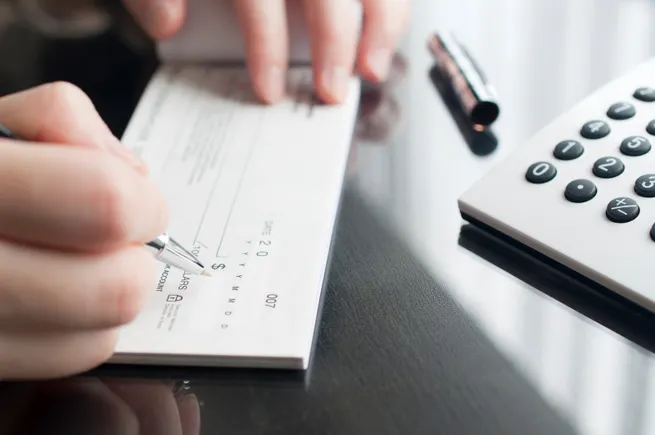Each year, the smallest U.S. companies — solo practitioners, landscapers, dog walkers or those with a few employees — handle trillions of dollars of payments via paper checks sent through the postal system.
Lest one thinks this centuries-old payment method is disappearing in the age of the digital wallet and instant payment clearing, it is not. In fact, paper check use has surged, with more than 90% of businesses using them, according to a report from the Association for Financial Professionals issued in April.
“They’re not ready for change,” said Dan Holt, co-founder and chief executive of BillGO, a startup that tries to resolve cash-flow problems for small companies by converting incoming paper checks into digital payments. About 33 million U.S. small businesses receive $6 trillion annually in paper-check payments, Holt said.
The company, based in Fort Collins, Colorado, has 154 employees and has raised about $187 million over the past decade since its founding. BillGO counts 75,000 customers and partner institutions in its payment network, called BillGO Exchange.
The platform integrates with bank infrastructure and works with various software tools such as QuickBooks and NetSuite to coordinate incoming payments with invoices and reconcile those. That can accelerate payments from an average 10-day waiting period to as little as one business day, BillGO says.
Holt spoke with Payments Dive on June 27. This conversation has been edited for clarity and brevity.
PAYMENTS DIVE: What incentivizes a small business owner to change their operation and incur the cost of your platform?

Dan Holt
Permission granted by BillGO
DAN HOLT: The number one reason they sign up is cash flow. You’re taking something that takes ten days to get to me. You’re giving it to me — it’s in my bank account the next day. Number two, the part that’s been fascinating to me: we’ve probably made a million reach-outs — whether calls, emails, whatever — the one thing that is very consistent is we have not found a single small business that has not had check fraud, an NSF (insufficient funds) or some type of a loss related to their payments with checks.
Will we have checks in 10 or 20 years? What’s your estimate on when their use begins to wane?
We’re going to keep seeing checks easily for 20 years. No doubt about that. I don’t think we’re out of it faster than that. We are unique here in the U.S. I don’t think there’s another country in the world that has 10,000 banks and credit unions. The complexity of that, along with the complexity that we have with all of these different software providers that provide embedded payments. How are all those providers going to connect with all these other businesses? They don’t, and so what ends up happening is, if you use an application like Bill, or use an application like QuickBooks, say you want to make a payment, on a business side, 40% of the time it goes out as a physical check. You don’t even know that it’s happening because you’re working with an application that seems digital, but the payment routing, there’s not a connection.
What effects do you expect from the executive order migrating the U.S. government from paper checks this year? Will that decrease private sector check use?
Anybody that’s receiving a payment from the government that was a check, you’re going to be forced into going digital, right? And I think it creates momentum. Now, how much are they going to be able to pull off? I don’t know. The government says a lot of things, and I take it a little bit with a grain of salt, because it takes a long time. Not saying it won’t happen, but it just takes a long time.
How do you approach virtual cards and is small business adopting that technology?
Something that is still blowing my mind today is the percentage of people that choose virtual card over ACH. We started BillGO Exchange as ACH only. We found, as we talked with a lot of potential customers, they didn’t want the ACH. Why? Because (payments) all come in so differently, and they don’t have a good way to reconcile it back and forth. Whereas their merchant acquiring system to accept card is already integrated into their accounts receivable. What fascinates me is 95% of our small businesses choose virtual card over ACH.
And what accounts for that?
If you’re a small business, you’re manually going to your bank and checking for every single ACH, and then you’re trying to reconcile it. And then, when we send you a card, and we send you the invoice data as well, that then can be automatically reconciled, and we have the ability to help them reconcile their ACH, but they still choose (the) card. Something that we found is people have had issues with ACH and chargebacks and things of that nature. There’s more trust in the card network. Now, of course, The Clearing House would hate for me to say this, and so would the Federal Reserve, but Visa and Mastercard would love me saying this: we found that at the actual small business that (network) brand is very valuable and they trust it a lot.
Interesting. What does that say about the future of pay-by-bank, which a lot of people are pushing at the retail level, the Starbucks, the gas station, etc?
This is not new, and they’re struggling to get people to sign up for it. You know, we also love our points. When we make a payment, it’s really a business-to-business payment. This is coming from BillGO to them. But on the consumer side, we’re still seeing people choose their card, whether it’s debit, credit, they choose their card. They have more trust in it. Most people are not comfortable with some retailer just having access to their bank account.
I guess there’s a fear of loss?
Yep. And if you’ve ever experienced how this works in banking, if you’ve ever experienced a chargeback on ACH, the bank does not give you the money right away. They wait 60 days. They don’t have to give it to you. Visa, Mastercard give it back to you first. Same with American Express, Discover, they give it back to you right away, and then, if it’s validated, they would actually charge you. Whereas the bank, it’s the opposite. I take the money out and then you can dispute it, but I’m not giving it back to you (immediately).
What worries you about the business?
There’s always the fraud side, that always worries me. Security and a breach, anything of that nature. It’s also, I would say, us not moving fast enough to take advantage of this opportunity. I mean, think of $6 trillion in checks – we’re just scratching the surface. We don’t even have 1% market share. I hate saying that, but it’s real.






